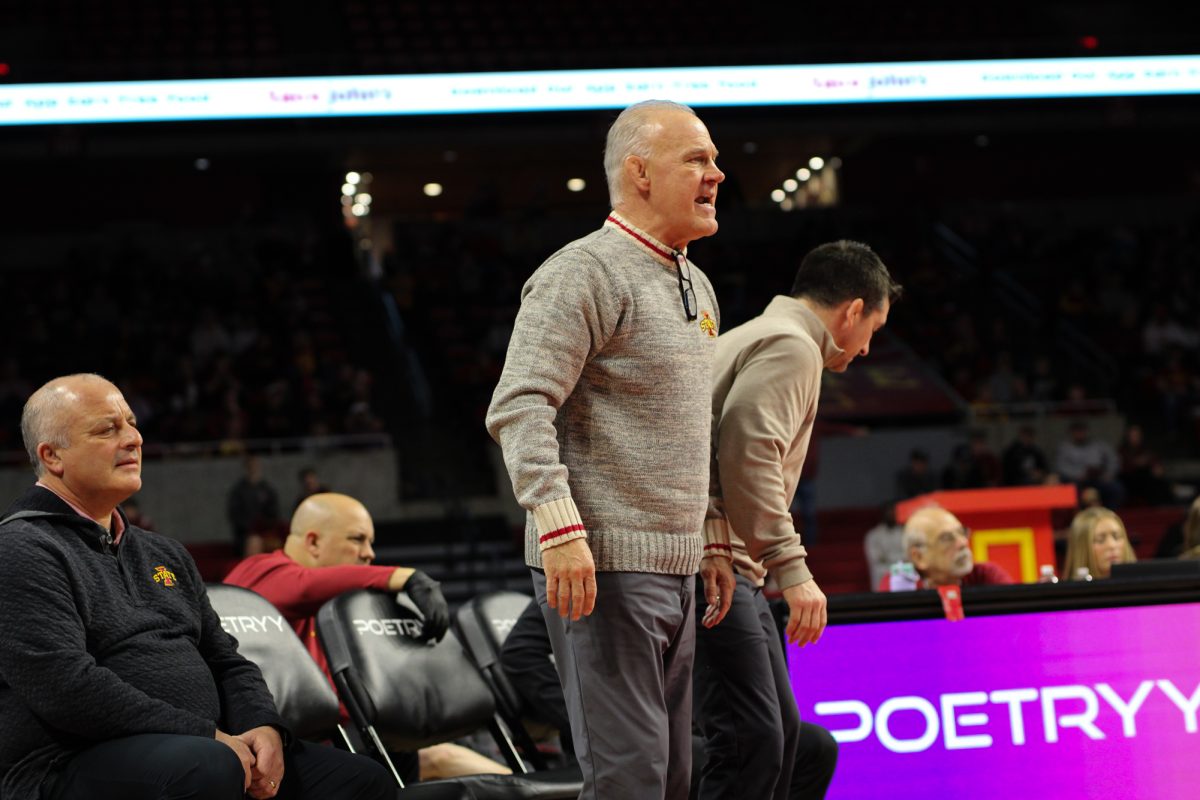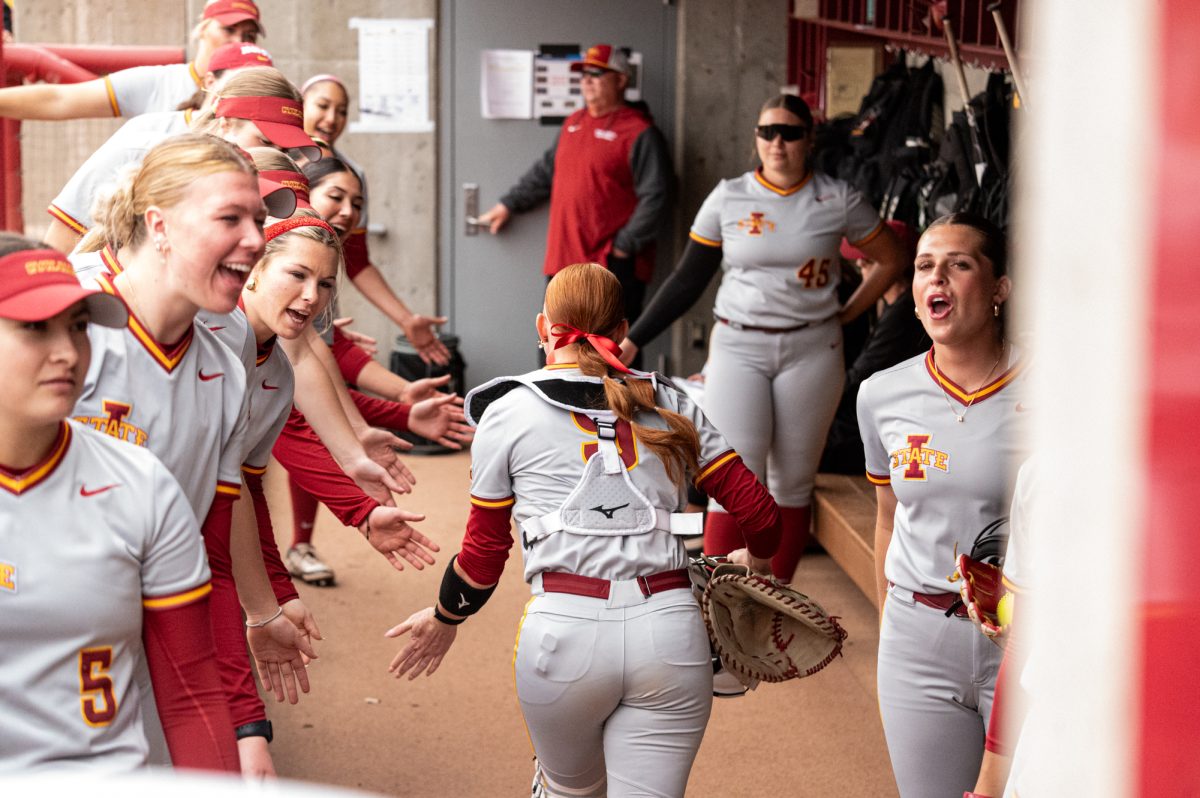WRESTLING: Road to recovery for Cyclone senior
April 26, 2010
Nick Gallick didn’t have a fairy-tale ending to his senior season but, instead, had to settle for a much more sobering outcome.
Gallick, a two-time All-American, suffered a deep tissue bruise on his thigh at the Harold Nichols Open on Nov. 14. The injury needed medical attention, which forced him to sit out for a majority of the season.
“I still feel like I could win a national title,” said Gallick, who is just three wins away from becoming the 36th Cyclone to record 100 career victories. “But, being in a lot of pain, it would be real hard to win a five-match national tournament.”
Gallick’s injury came at an inopportune time in his career. The Tuscon, Ariz., native was ranked No. 1 in the nation at 141 pounds before his injury, and was a contender for the national title at his weight class.
“We really thought that he had a great chance to be an NCAA champion,” said coach Kevin Jackson, who led the team to a 13-2 record in his first season at the helm of the Cyclones’ wrestling program. “I don’t want to take anything away from the NCAA champion [Cornell’s Kyle Dake], but I’ve got a lot of confidence that Nick would have given himself a great chance to be the champ this year.”
Despite his condition, Jackson decided to wrestle Gallick in the Dec. 6 dual meet against top-ranked Iowa. In the meet, a scary scene ensued, as Gallick showed signs of re-aggravating of his injury in the third period of the match.
“During the match, I was in a position where I strained my injury, but I never really was better,” Gallick said. “I’ve been injured all year, I’ve been injured over the summer, so it really was never better. So, going into the match, it was more doing what I could to pull out a win and finish the match.”
Despite giving up a 5-2 lead heading into the third period, he managed to defeat the Hawkeyes’ Dan LeClere with riding time on his side by a sudden victory decision of 8-6.
The senior 141-pounder sat out after the dual meet against Iowa with hopes of healing his injury in time for him to get back on the mat. Little did he know that his victory over LeClere would be his last match of the season, as he underwent season-ending surgery on Jan. 22. Gallick hopes to be granted a medical redshirt to return for a second shot at the tournament championship.
“I can’t just think about myself by saying, ‘Oh, I’ll give it a try,’” Gallick said. “I’ve really got to think about the team in that situation.”
In Gallick’s absence, sophomore Dalton Jensen was given the go-ahead to step in as the starter at 141 pounds. Jensen didn’t expect the opportunity to cross his path until next year, but tried to make the most of it by recording four pins.
“I was sorry that [Gallick] got hurt,” Jensen said. “He was ranked first in the nation, so it was kind of hard to see him go down, but it was what I had been training for, and I was ready to go at any time.”
It was agreed upon that sitting Gallick out for the rest of the season would be the best situation for the team, giving him time to recover from his injury and allowing young talent to gain valuable experience.
“We felt that it could hurt the team a lot more [with] having me try and compete, versus having Jensen be able to get in there and really compete like he did,” Gallick said. “And that always helps the team.”
According to the NCAA’s Division I student-athlete reinstatement policy, as stated in Bylaw 30.6.1.1, the student-athlete could be considered for reinstatement under two conditions: If the student-athlete was denied two full, competitive seasons beyond his or her control, or if the student-athlete has been eligible for four full competitive seasons in his or her five-year period of eligibility as a collegiate athlete but was not able to compete for the four full seasons for reasons beyond their control, reinstatement could be considered.
The NCAA reinstatement staff will take this into consideration in their reviewing process.
The athletic program must also provide sufficient documentation of the student-athlete’s injury, which must include objective medical advice and treatment from a licensed medical doctor in order to be considered for reinstatement or be granted an extension of eligibility. In Gallick’s case, the documentation was sent this week to the NCAA reinstatement staff by Iowa State’s athletic department on his behalf.
“Now it’s going to be in the hands of the NCAA,” Jackson said. “We’re just in a wait-and-see mode.”
In his redshirt freshman year, Gallick pinned his way out of the preliminary round of the 2007 NCAA tournament at Auburn Hills, Mich., and proceeded to record another pin to advance to the second round, at 133 pounds. He lost his next two matches, however, causing him to bow out of the tournament.
The next year, Gallick found success at the NCAA Championships after moving up to 141 pounds, reaching the quarterfinals before getting beaten by No. 1 Chad Mendes of Cal Poly by a 5-0 decision. In the wrestlebacks, he won his next two matches to earn All-American honors before getting beaten by No. 2 Charles Griffin of Hofstra by a 3-2 decision, dropping him to the fifth-place match. It was there that he defeated Army’s Matthew Kyler by a 3-2 decision to place fifth.
In 2009, Gallick emerged as a team leader and dominating presence at 141 pounds for the Cyclones heading into the NCAA tournament, recording a 29-4 record. He managed to advance to the quarterfinals for the second straight year before being pinned by eventual champion, J. Jaggers of Ohio State, to drop to the wrestlebacks.
It was there that he strode his way to the third-place match, where he managed to defeat No. 2 Zach Tanelli of Wisconsin by a 5-3 decision to place third.
This year, Gallick didn’t get to wrestle alongside his teammates at the NCAA tournament. Instead, he was forced to watch as a spectator while fellow seniors Jake Varner and David Zabriskie — both of whom came to Iowa State at the same time he did as members of the highly touted 2005 recruiting class — went on to win national championships in their respective weight classes.
“It didn’t feel great, for me, but I was very happy for them,” Gallick said of his teammates. “With my situation, I wasn’t able to compete, and it hurts to not be able to compete, but watching them win a national title doesn’t make it hurt anymore for me.”
Gallick would likely have been an invaluable piece to the puzzle for the Cyclones, who placed third at the NCAA tournament behind Cornell and national champion Iowa.
“[The injury] had an impact, based on the points that we would have probably got at the NCAA tournament,” Jackson said.
If Gallick is reinstated next year, there would be a slight possibility that he could be moved up to 149 pounds because of his increasing size and strength, which would leave a much more experienced Jensen in the starting spot for Iowa State’s 141-pounders.
“I really believe he could compete at 149 as well, and we want him to compete at the weight class where he’s at his best and is big enough and strong enough to compete at,” Jackson said. “For the lineup and the strength of our team, 149 would probably be perfect for him.”







